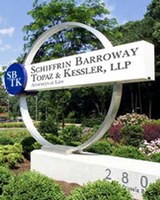This is a forwarded news release announcing that a group of shareholders of Eli Lilly are seeking to sue officers and directors of the corporation for illegal fraud regarding their psychiatric drug Zyprexa.
Forwarded news release; to read original source click here.
Mon, 02 Apr 2007 23:00:00 GMT
RADNOR,Pa., April 2 /PRNewswire/ — The following statement was issued todayby the law firm of Schiffrin Barroway Topaz & Kessler, LLP:
TheComplaint charges Lilly and certain of its officers and directors withviolations of the Securities Exchange Act of 1934 for disseminatingfalse and misleading statements concerning Zyprexa, the Company’sbest-selling product.
More specifically, the Complaint allegesthat the Company failed to disclose and misrepresented the followingmaterial adverse facts which were known to defendants or recklesslydisregarded by them:
- (a) that they were aware of the clear link betweenZyprexa and diabetes; and yet failed to warn the public at large of theserious and material risks associated with Zyprexa use;
- (b) that theyhad engaged in an illicit scheme to offset a drop in sales that wascertain to occur (and, in fact, did occur) when reports of Zyprexa’sside effects surfaced, by creating a marketing plan for Zyprexa whichincluded, as a primary component, the evaluation and pursuit of salesopportunities for the drug based on “off-label” uses;
- (c) that thegrowth rate in Zyprexa sales would not be sustainable once informationabout the health risks of Zyprexa and Lilly’s illegal marketing planwere disclosed publicly;
- (d) that they disregarded data that underminedthe “safety and effectiveness” of the drug;
- (e) that their”quality-assurance procedures relating to the quality and integrity ofscientific information and production” as it pertained to Zyprexa werewoefully inadequate;
- (f) that, by engaging in an illicit “off-label”marketing” program as to Zyprexa, they had not “enhance[d]” itspolicies and procedures designed to assure that its marketing andpromotional practices and physician communications “compl[ied] withpromotional laws and regulations;”
- (g) that they failed to warn thepublic of the serious health risks associated with Zyprexa use and thatits illicit “off-label” marketing program was a direct violation of itsown code of conduct as set forth in “The Red Book;” and
- (h) that theirillicit scheme of concealing the side effects of Zyprexa and engagingin a massive illegal off- label marketing campaign potentiallysubjected Lilly to substantial regulatory fines, penalties and otherlegal action, thereby compromising the Company’s overall financialcondition and prospects.
Sales of Zyprexa grew from $3.69billion to $4.42 billion between 2002 and 2004, and Lilly’s stock priceincreased from $43.75 per share to $76.95 per share between July 18,2002 and May 7, 2004. Throughout the Class Period, Lilly had internalinformation concerning a dangerous connection between the use ofZyprexa and extreme weight gain and diabetes.
During the ClassPeriod, in the face of mounting independent research connecting Zyprexato diabetes and weight gain, and the lawsuits by persons who sufferedthese side-effects, Lilly emphatically denied any such link. Yet, aspublic agencies raised warnings about the safety of Zyprexa, salesslowed and Lilly’s stock price dropped from $76.95 per share to $50.34per share between May 7, 2004 and October 25, 2004 (representing a lossof market capitalization of over $30 billion).
However, recentreports in The New York Times demonstrate that Lilly knew of the veryhealth risks that it denied repeatedly and that the Company alsopurposefully marketed Zyprexa for illegal, off-label uses.
Thus,the over $30 billion dollar decline in Lilly’s stock price between May7, 2004 and October 25, 2004 was the direct result of defendants’fraudulent conduct. Articles appearing in The New York Times betweenDecember 17 and 21, 2006 publicly disclosed for the first time that (a)the Company had engaged in a decade-long effort to play down the healthrisks of Zyprexa; and (b) Lilly actively marketed Zyprexa for illegaloff-label uses (such as to treat older patients with symptoms ofdementia).
The publication of those articles caused anadditional $3.49 per share decline in the Company’s stock price (or 6.4percent), and represented a further market loss of approximately $3.5billion.
Plaintiff seeks to recover damages on behalf of classmembers and is represented by the law firm of Schiffrin Barroway Topaz& Kessler which prosecutes class actions in both state and federalcourts throughout the country. Schiffrin Barroway Topaz & Kessleris a driving force behind corporate governance reform, and hasrecovered billions of dollars on behalf of institutional and individualinvestors from the United States and around the world.
If youare a member of the class described above, you may, not later than June1, 2007, move the Court to serve as lead plaintiff of the class, if youso choose. A lead plaintiff is a representative party that acts onbehalf of other class members in directing the litigation. In order tobe appointed lead plaintiff, the Court must determine that the classmember’s claim is typical of the claims of other class members, andthat the class member will adequately represent the class. Undercertain circumstances, one or more class members may together serve as”lead plaintiff.” Your ability to share in any recovery is not,however, affected by the decision whether or not to serve as a leadplaintiff. You may retain Schiffrin Barroway Topaz & Kessler orother counsel of your choice, to serve as your counsel in this action.
Link to Schiffrin Barroway Topaz& Kessler law firm click here.
Document Actions


